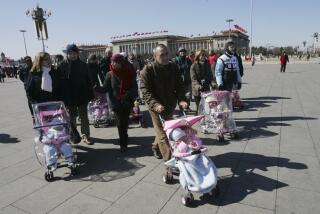China Steps Up Enforcement of 1-Child-Per-Family Law : Birth control: With 1.1 billion people--about one-fifth of the world’s population--Beijing fears that it may pay the price for unchecked procreation under Chairman Mao.
- Share via
BEIJING — China, worried by predictions of a record baby boom, is renewing its foundering one-child-per-family campaign.
“Now we are facing the biggest boom ever in the numbers of women of child-bearing age,” said Shen Guoxiang, director of publicity at the State Family Planning Commission.
He said a national meeting on birth control in February had decreed that education and propaganda be intensified to encourage the one-child family.
Western nations have repeatedly condemned China’s one-child policy as Draconian and inhumane.
“China is different,” Shen said. “If America had 1.1 billion people, then they would not be so concerned about this humanitarianism they talk about.”
China is the world’s most populous nation, where about one-fifth of mankind lives off about 7% of the world’s total farmland.
The expected baby boom is a consequence of unchecked procreation under the rule of the late Chairman Mao Tse-tung, who once called birth control “bloodless genocide.”
In the 1950s, Mao said people were “the most valuable resource” and birth control was a plot hatched by China’s enemies.
Only after Mao’s death in 1976 were widespread population curbs introduced to limit the millions of extra mouths eating away at China’s economic gains.
In the year 2000, there will be 340 million women in China capable of having children, up 35 million from last year’s figure. The increase in women of child-bearing age, twice as fast as during two previous population explosions, will peak between now and 1992.
Unless birth-control policies are strictly enforced, China will overshoot its target of 1.2 billion people in the year 2000, official press reports say.
Fines, persuasion, education and outright bans are China’s main weapons against what some Western commentators have called “enemies in the womb.”
Rewards of money or land as well as praise are given to couples who vow to have only one child. Extra cash is handed to those who prove their fervor by opting for sterilization.
This year’s campaign aims to instill zeal into local officials to enforce the punishments and rewards, educate couples on the benefits of small families and persuade women to abort unauthorized babies.
It will be targeted mainly at rural areas where officials previously have winked at as many as three children in a family, after attempts to enforce the one-child rule led to the widespread murder of baby girls.
Sons are praised in the countryside as future breadwinners and inheritors of an ancient belief in ancestor worship. A family with no sons is a disgrace to its forebears.
“The problem is ignorance,” said Shen. “Many people in the countryside just do not understand that it is for their own good and the benefit of China to have fewer children and best to have one.”
The one-child rule will not be as rigidly enforced in rural areas as it is in cities, but statistics must show an improvement from a current average of 2.8 babies per rural family and 40% of births being outside the state plan, Shen said.
He said local officials have much autonomy in deciding punishments for couples who have too many children.
“Normally, the women are willing to abort,” Shen said. “But if they are not, then the local cadres come ‘round to persuade them a little.”
For every two babies born in China last year, one was aborted, he said. The time limit for abortions was normally three months into the pregnancy, but some “stubborn” women resisted persuasion at first and had to have the fetus removed in its fourth month or later, Shen said.
More to Read
Sign up for Essential California
The most important California stories and recommendations in your inbox every morning.
You may occasionally receive promotional content from the Los Angeles Times.













